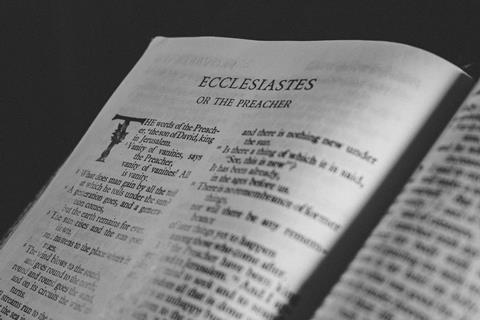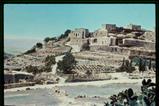Elaine Storkey gives us four lessons from the perplexing book of Ecclesiastes

By our late 20s, many of us will have become aware of periods in our lives that feel a bit empty. These times can leave us feeling in a rut or facing a dead-end. They might make us feel listless or depressed. On a bad day we find ourselves looking back over our shoulder, regretting bad decisions we made or opportunities we failed to grasp. Sometimes we can even feel that there is nothing much left for us, that however we try to change it, life will continue in its mundane, drab way, with very little to look forward to. When we feel dragged down by these kinds of emotion, it’s not a great place to be.
It seems on first reading that the writer of Ecclesiastes felt like that. This is one of the wisdom books of the Bible, and yet it starts with the Teacher shouting: “Meaningless, meaningless…everything is meaningless!…What has been will be again, what has been done, will be done again; there is nothing new under the sun” (vv1,9). These are very strange words of wisdom. You could be forgiven for thinking the Teacher wants us to feel miserable. Why doesn’t he cheer us up by talking about God’s love, or jolly us along to make us feel that life is really worth living? Well, he doesn’t. Instead, his message seems to be that we’re born into a life, predictable and pointless, where the dead are better off than the living and luckiest of all are those who have never been born! Most of the time we are simply “chasing after the wind” (2:26). He sums it all up by saying: “Eat, drink and be merry” (see 2:24, 8:15), remembering, no doubt, that Isaiah adds: “For tomorrow we die” (Isaiah 22:13).
A strange yet wise series of sayings
Ecclesiastes is a strange book, even compared with other difficult books in the Old Testament. Because much of it is about the futility of life, and so we could wonder what it’s doing in the Bible at all! Many of the things the Teacher says would be more likely today to be found on the lips of an atheist. But the Teacher is not an atheist. He believes in a personal God who knows us and sees what we do. He believes that good and evil exist and God judges between them. Yet, in spite of that, he has no words of comfort for those who are oppressed and doesn’t try to explain to us how to make any sense of life.
Paradoxically, I actually find Ecclesiastes encouraging. If one of the wisest biblical authors can show such disillusionment or scepticism about the world and our place in it, then it gives me permission sometimes to feel the same. And if this writer can carry on still believing that at the heart of it all is a Creator God whose heart is for justice, then I can take comfort from this too, even at my most dejected state. The author of Ecclesiastes echoes many of the emotions and questions experienced by real human beings. And, like writers in the psalms, he helps us to express those emotions in powerful words and images.
There is more, however, to the book of Ecclesiastes than this. Though it’s unique, it also echoes much of the teaching we find in the rest of the Bible. Peppered through all the moans about meaninglessness and futility are crucial comments about justice, purpose and the values we should live by. I want then, to share four things from this book.
A season for everything
The writer has a strong sense of time. In Ecclesiastes 3:1-8 he describes “every activity under the heavens” (v1). This passage could describe our lives right now just as accurately as it does the lives of people all those centuries ago. It even addresses what we have had to face during lockdown. This has been indeed a time to mourn, and a time to weep. We’ve seen the desolation of those who have lost loved ones and nursing staff who’ve been with people losing the fight for life. It’s been a time to refrain from embracing, being careful with those who are vulnerable, in case we are unknowing carriers of the infection.
Did you notice, too, how the Teacher speaks of opposite times as though they belong together: killing and healing, tearing down and building up? During the pandemic we’ve seen this: how killing (the virus) is part of healing (the body); how breaking down (our fears of the chemicals in vaccinations) has been part of building up (our resistance to the infection).
More generally, the writer’s sense of time speaks into our ordinary daily lives. How many of us have finally thrown away something that we have kept for ages, knowing that its time has now finally finished? Even acknowledging that there is a time for hate is important. For if we don’t learn to hate the sins that God hates, we’ll never experience the love and freedom of God’s forgiveness. In this wonderful passage, God trusts us with these many gifts of time and asks us to use them wisely.

No satisfaction in material things
The second big thing we learn from Ecclesiastes is that nothing in life can give us ultimate satisfaction. It really is ‘vanity’ to chase after material longings in the hope that they will bring us great happiness. A billionaire was once asked how much money he needed to make himself really happy. His answer? “Just a little bit more.” He was unconsciously acknowledging what the Teacher says here (5:10): “Whoever loves money never has enough; whoever loves wealth is never satisfied with their income.” Jesus went on to tell us that where our treasure is, there our hearts are also (see Matthew 6:21). But our hearts can never rest in possessions; they need God. And because we can’t find deep peace there, material longings become insatiable. So the Teacher reminds us that it is far better to be content with what we have – to eat, drink and find satisfaction (see 2:24) – than to wear ourselves out striving for things we don’t have. Those things will never fulfil us anyway.
Worrying doesn’t achieve anything
This links us to the third thing I find in this biblical book: a warning not to worry about the future. It really is pointless getting into a fret about all the bad things that might happen. At its worst, this level of worry means we’re not really living at all; we’re just building up fears that restrict our capacity to enjoy our lives. Instead the Teacher encourages us to enjoy the present moment and live one day at a time. It is as if he is already anticipating what Jesus is going to say in Matthew 6:34 where he tells us not to get worked up and anxious about food or clothes or the future: “Do not worry about tomorrow; for tomorrow will worry about itself. Each day has enough troubles of its own.”
Living with the assurance we are seen by God
The fourth and most important lesson from Ecclesiastes is that we live our lives before a just God who knows us and sees how we live. In spite of injustice, oppression, the suffering of the vulnerable and “evil in everything that happens under the sun” (9:3), he reminds us that the righteous are still in God’s hands (9:1). God will bring every deed into judgment, whether good or evil, including everything we’ve been trying to hide (12:14). So we’re urged to carry on in faith before God, keeping his commandments, remembering him (12:1,6 ) until “the spirit returns to God who gave it” (12:7). Life is meaningless without God; the Teacher is right. But as we move into 2022 and all the year will bring us, with God at the centre of our lives, we have everything to live for.
































